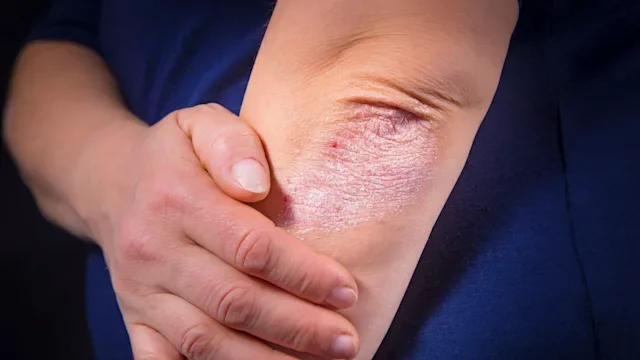Key takeaways:
Autoimmune disease (AID) is caused by both genetic and environmental triggers.
There are many different types of environmental triggers.
Changing your environment can sometimes improve your AID symptoms.
Autoimmune diseases (AIDs) are a type of health condition where your immune system attacks its own cells and tissues. Autoimmune disorders are common, and they may even affect you or someone you care about. In fact, up to 9% of people in the United States have an autoimmune condition — though this varies by gender, ethnicity, and geographic location.
While autoimmune conditions vary widely in symptoms and severity, they all have the same underlying problem: Your body’s immune cells attack your own body.
Common types of AIDs include:
Rheumatoid arthritis (RA)
Multiple sclerosis (MS)
Graves’ disease
Addison’s disease
Myasthenia gravis
AIDs can be hard to diagnose, treatment can be a challenge, and identifying the underlying cause is often difficult.
Though many genes are connected to AIDs, scientists still don’t know for sure exactly what causes these disorders. And while we know that genetics — and your family history — definitely plays a role, it’s possible that up to 70% of autoimmune diseases may actually be caused by environmental factors — like:
Diet
Lifestyle
Exposure to toxic chemicals
Infections
Read on to learn about specific environmental triggers for AID, and what you can do in your environment to reduce your risk or improve your symptoms.
What environmental triggers are associated with autoimmune diseases?
In people with a genetic predisposition (where their genes put them at risk), certain environmental exposures can trigger autoimmune disease. These include toxins, infections, diet, and more.
Can toxins cause an autoimmune disease?
Yes. Multiple environmental toxins have been linked to autoimmune diseases. For example, cigarette smoking may increase your risk of:
RA
Lupus
MS
Graves’ disease
Read more like this
Explore these related articles, suggested for readers like you.
Additional toxic exposures linked with AIDs include:
Not all people with these exposures develop AIDs. There are other factors involved, like epigenetics and your family history.
Can your diet cause autoimmune disorders?
Yes. Dietary factors and the gut microbiome may also contribute to the underlying causes of autoimmune conditions. There are changes in the gut microbiome in people with certain autoimmune disorders like type 1 diabetes and RA. And, in some people, eating gluten can lead to an abnormal immune response and the development of celiac disease.
Again, not all people with dietary risk factors will get an autoimmune condition. Just like other exposures, diet is only one possible contributing factor.
Can an infection cause autoimmune disease?
Yes. Infections are a known trigger for AIDs in people with a genetic predisposition. Infections have been linked with many autoimmune conditions including:
Type 1 diabetes
MS
Lupus
RA
Infections connected with AIDs include:
Can mold cause autoimmune disorders?
No. While there has been concern raised that mold in the environment could be a trigger for autoimmunity, there is currently no scientific evidence that mold can cause AIDs.
Other possible triggers
There are some other possible triggers of AIDs including:
Emotional stress or trauma: Stressful life events or trauma may increase your risk of developing an AID.
Pregnancy: AIDs often present within the first year after a pregnancy.
Medications: Many medications have been linked to the development of AIDs, particularly lupus.
How do environmental factors cause autoimmune disease?
It can be hard to know why environmental factors trigger autoimmunity in some people but not others. A combination of genetics, the immune system, and other factors such as diet and the gut microbiome likely play a role. It’s possible that when people with an increased genetic risk are exposed to certain environmental factors, the immune system can turn on itself.
Can you “cure” yourself if you remove the environmental cause of your AID?
No. You cannot cure yourself of an AID after the disease process has started. But making changes in your life may help improve your symptoms, and keep your disorder from getting worse.
What can be changed in your environment to improve your AID?
You can’t control every part of your environment. But there are steps you can take in your lifestyle and diet to help you feel more in control of an AID. And some environmental changes may even help your symptoms get better.
Improve your diet and vitamin levels
Diet may play a role in autoimmune conditions. There is some evidence that special diets like the Autoimmune Protocol (AIP) could help with autoimmune symptoms and inflammation levels. This could have to do with improving the strength of the intestinal lining and the health of the gut microbiome.
Vitamin D plays an important role in the healthy functioning of our immune system, and low levels are associated with both cancer and autoimmune conditions. Keeping your vitamin D levels at a good level may help with AIDs.
Exercise
Exercise can help improve the following in autoimmune conditions:
Fatigue
Mood
Mobility
Quality of life
The amount and intensity of your exercise regimen will depend on your condition, but moving your body and getting your heart rate up every day is helpful.
Improve sleep
Fatigue can be an issue for many people with autoimmune conditions, and sleep is an essential part of keeping your immune system healthy. Make sure to practice good sleep hygiene and try to get at least 7 hours of quality sleep every night.
Consider your climate
Weather changes or extremes can trigger symptoms in some people with AIDs. Because of this, it’s possible that some climates may be better for autoimmune diseases than others, like milder climates with minimal temperature variability.
Manage stress
Working on stress reduction is important. High stress can have a negative effect on your immune system. This not only can lead to the development of autoimmune conditions, but it also plays a role in how effective treatment may be.
Quit smoking
If you smoke, quitting is important. Not only can it trigger AIDs, but it can make your symptoms worse and weaken your immune system.
The bottom line
When someone with a genetic predisposition encounters an environmental trigger, it can lead to an AID. Figuring out the specific environmental cause can be hard. Most often it is a toxin exposure, infection, or dietary trigger. There may be some steps you can take to improve your symptoms and take control of your autoimmune disease.

Why trust our experts?


References
Arango, M., et al. (2013). Infection and autoimmune diseases. Autoimmunity: From Bench to Bedside. El Rosario University Press.
Besedovsky, L., et al. (2011). Sleep and immune function. Pflügers Archiv: European Journal of Physiology.
Borchers, A. T., et al. (2017). Mold and human health: A reality check. Clinical Reviews in Allergy & Immunology.
Brody, H. (2020). The gut microbiome. Nature.
Buening, B., et al. (2017). Relationship between pregnancy and development of autoimmune diseases. Journal of Women’s Health, Issues, and Care.
Centers for Disease Control and Prevention. (2024). About Escherichia coli infection.
Centers for Disease Control and Prevention. (2024). About family health history.
Centers for Disease Control and Prevention. (2025). About cytomegalovirus.
Centers for Disease Control and Prevention. (2025). About scarlet fever.
Centers for Disease Control and Prevention. (2025). About strep throat.
Centers for Disease Control and Prevention. (2025). Epigenetics, health, and disease.
Chandrasekaran, A., et al. (2019). The autoimmune protocol diet modifies intestinal RNA expression in inflammatory bowel disease. Crohn’s & Colitis 360.
Costenbader, K. H., et al. (2006). Cigarette smoking and autoimmune disease: What can we learn from epidemiology? Lupus.
Dunne, J. L., et al. (2014). The intestinal microbiome of type 1 diabetes. Clinical and Experimental Immunology.
Jörg, S., et al. (2016). Environmental factors in autoimmune diseases and their role in multiple sclerosis. Cellular and Molecular Life Sciences.
Konijeti, G. G., et al. (2017). Efficacy of the autoimmune protocol diet for inflammatory bowel disease. Inflammatory Bowel Diseases.
Lupus Foundation of America. (n.d.). Smoking and lupus: It’s never too late to quit.
Mayo Clinic Staff. (2023). Stress management. Mayo Clinic.
Meier, H. C., et al. (2016). Association between vitamin D deficiency and antinuclear antibodies in middle-aged and older U.S. adults. Cancer Epidemiology, Biomarkers & Prevention.
Meyer, A., et al. (2017). Pesticide exposure and risk of rheumatoid arthritis among licensed male pesticide applicators in the Agricultural Health Study. Environmental Health Perspectives.
Mori, H., et al. (2019). Influence of seasonal changes on disease activity and distribution of affected joints in rheumatoid arthritis. BMC Musculoskeletal Disorders.
Mu, Q., et al. (2017). Leaky gut as a danger signal for autoimmune diseases. Frontiers in Immunology.
National Cancer Institute. (n.d.). Genetic predisposition. National Institutes of Health.
National Cancer Institute. (n.d.). Immune cell. National Institutes of Health.
National Institute of Diabetes and Digestive and Kidney Diseases. (2020). Symptoms & causes of celiac disease. National Institutes of Health.
National Institute of Environmental Health Sciences. (2024). Autoimmune diseases. National Institutes of Health.
National Institute of Environmental Health Sciences. (2024). Autoimmune diseases and your environment. National Institutes of Health.
National Institute of Environmental Health Sciences. (2024). Toxicology. National Institutes of Health.
NIH Research Matters. (2018). Epstein-Barr virus and autoimmune diseases. National Institutes of Health.
Niklas, K., et al. (2016). Rheumatic diseases induced by drugs and environmental factors: The state-of-the-art – part one. Reumatologia.
Pollard, K. M., et al. (2011). Toxicology of autoimmune diseases. Chemical Research in Toxicology.
Shah, M., et al. (2013). Brief report: Ultraviolet radiation exposure is associated with clinical and autoantibody phenotypes in juvenile myositis. Arthritis and Rheumatism.
Sharif, K., et al. (2018). Physical activity and autoimmune diseases: Get moving and manage the disease. Autoimmunity Reviews.
Somers, E. C., et al. (2015). Mercury exposure and antinuclear antibodies among females of reproductive age in the United States: NHANES. Environmental Health Perspectives.
Song, H., et al. (2018). Association of stress-related disorders with subsequent autoimmune diseases. Journal of the American Medical Association.
Strickland, F. M., et al. (2013). Diet influences expression of autoimmune-associated genes and disease severity by epigenetic mechanisms in a transgenic mouse model of lupus. Arthritis and Rheumatism.
Tervaert, C., et al. (2017). Silicone breast implants and autoimmune rheumatic diseases: Myth or reality. Current Opinion in Rheumatology.
Vaahtovuo, J., et al. (2008). Fecal microbiota in early rheumatoid arthritis. The Journal of Rheumatology.
Vojdani, A., et al. (2014). Environmental triggers and autoimmunity. Autoimmune Diseases.
Wang, L., et al. (2015). Human autoimmune diseases: A comprehensive update. Journal of Internal Medicine.
Xu, H., et al. (2019). The dynamic interplay between the gut microbiota and autoimmune diseases. Journal of Immunology Research.
Zielinski, M. R., et al. (2019). Fatigue, sleep, and autoimmune and related disorders. Frontiers in Immunology.

















